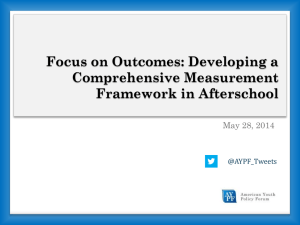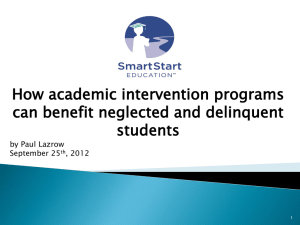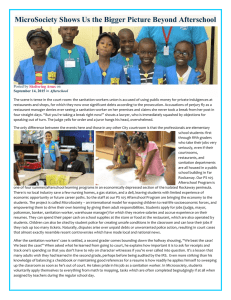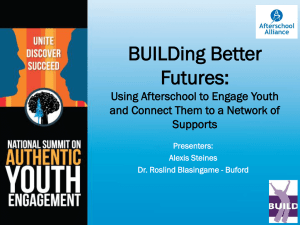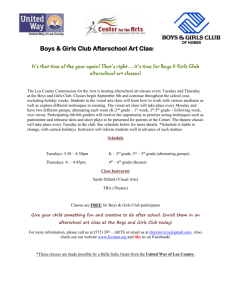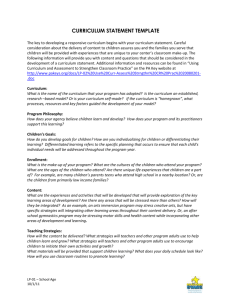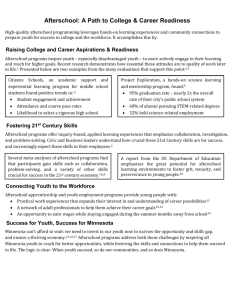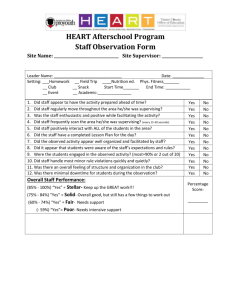Luigi (special Needs) - Afterschool Alliance
advertisement
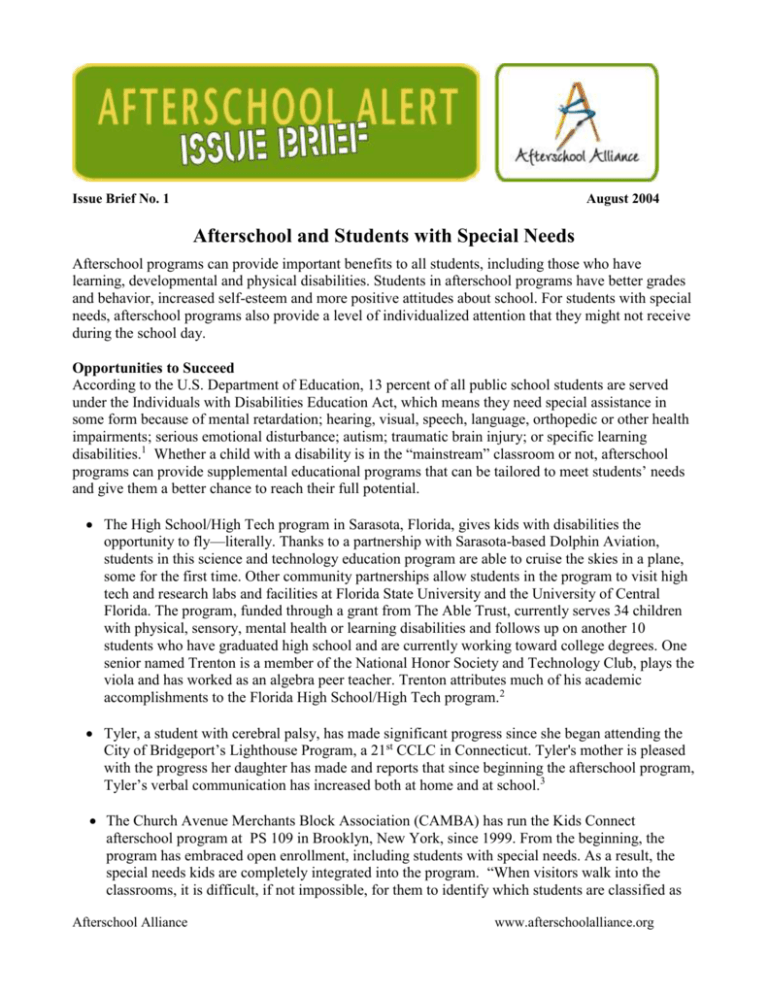
Issue Brief No. 1 August 2004 Afterschool and Students with Special Needs Afterschool programs can provide important benefits to all students, including those who have learning, developmental and physical disabilities. Students in afterschool programs have better grades and behavior, increased self-esteem and more positive attitudes about school. For students with special needs, afterschool programs also provide a level of individualized attention that they might not receive during the school day. Opportunities to Succeed According to the U.S. Department of Education, 13 percent of all public school students are served under the Individuals with Disabilities Education Act, which means they need special assistance in some form because of mental retardation; hearing, visual, speech, language, orthopedic or other health impairments; serious emotional disturbance; autism; traumatic brain injury; or specific learning disabilities.1 Whether a child with a disability is in the “mainstream” classroom or not, afterschool programs can provide supplemental educational programs that can be tailored to meet students’ needs and give them a better chance to reach their full potential. The High School/High Tech program in Sarasota, Florida, gives kids with disabilities the opportunity to fly—literally. Thanks to a partnership with Sarasota-based Dolphin Aviation, students in this science and technology education program are able to cruise the skies in a plane, some for the first time. Other community partnerships allow students in the program to visit high tech and research labs and facilities at Florida State University and the University of Central Florida. The program, funded through a grant from The Able Trust, currently serves 34 children with physical, sensory, mental health or learning disabilities and follows up on another 10 students who have graduated high school and are currently working toward college degrees. One senior named Trenton is a member of the National Honor Society and Technology Club, plays the viola and has worked as an algebra peer teacher. Trenton attributes much of his academic accomplishments to the Florida High School/High Tech program.2 Tyler, a student with cerebral palsy, has made significant progress since she began attending the City of Bridgeport’s Lighthouse Program, a 21st CCLC in Connecticut. Tyler's mother is pleased with the progress her daughter has made and reports that since beginning the afterschool program, Tyler’s verbal communication has increased both at home and at school.3 The Church Avenue Merchants Block Association (CAMBA) has run the Kids Connect afterschool program at PS 109 in Brooklyn, New York, since 1999. From the beginning, the program has embraced open enrollment, including students with special needs. As a result, the special needs kids are completely integrated into the program. “When visitors walk into the classrooms, it is difficult, if not impossible, for them to identify which students are classified as Afterschool Alliance www.afterschoolalliance.org having special needs. Furthermore, the fact that most children receiving special education services are able to stay in the program and are not often suspended or expelled from the afterschool program speaks to the success of the strategies we have implemented to support children with special needs.” 4 Bringing Youth Together Because the education system frequently separates students with disabilities from those without, students in both groups often have limited opportunities to develop typical peer relationships with each other. Classroom diversity isn’t just about race or ethnicity—it must also be about bringing together kids with different abilities and showing all kids that being “different” isn’t so unusual. Afterschool programs can provide all students with the chance to interact, learn about each other and learn social skills that will guide them throughout their lives. Central Connecticut Arc, Inc. offers an afterschool program in New Britain, Connecticut, that gives teenagers with disabilities the opportunity to interact with other teens who do not have disabilities. Teens can enjoy swimming, arts and crafts, visits to the public library and volunteering at a local museum and hospital as part of their afterschool activities.5 Easter Seals Oregon, partnering with Rogue Valley YMCA, offers After School R & R, a program for children with special needs ages 5-12 with specially trained staff. The program runs Monday through Friday at two local elementary schools. Children are able to join in with other students from the schools in games, supervised play, crafts, music and sports. Kids learn many of life’s most important lessons after school. How to be part of a team. How to follow rules. How to share ideas, triumph, defeat. How to be a friend. Until recently, children with disabilities haven’t been given a chance to learn all of this… — Parent of After School R & R participant 6 When he was only two months old, Luigi was involved in a serious car accident that left him severely scarred and damaged his coordination skills. As he grew older, he had problems keeping up with his lessons and homework in school; he also disrupted class frequently and was often teased by his classmates. Seeing a possible solution in afterschool programs, Luigi’s mother enrolled him in LA’s BEST (Better Educated Students for Tomorrow). At LA’s BEST, Luigi learned to use every computer program at the center, to read (in Spanish and English) anything placed in front of him and to dance Ballet Folklorico well enough to participate in a City Hall performance. Luigi has gained confidence and the respect of his classmates and is even trying sports now.7 1 http://www.kidstogether.org/idea.htm. Pecquet, Julian, “Program lifts disabled students higher; The High School/High Tech program aids 34 teens dealing with educational obstacles,” Sarasota Herald-Tribune (Florida), February 1, 2004; http://www.abletrust.org/planned_giving/impact/foundation.shtml. 2 3 Data courtesy of U.S. Department of Education, July 2000. 4 http://www.tascorp.org/toolbox/promising_practices/specialneeds. Central Connecticut Arc, Inc., “CCArc Offers An After School Program for Teenagers with Disabilities,” After School Program for Teenagers with Disabilities, 29 Nov. 2001, <http://www.ccarc.com>. 6 Easter Seals Oregon, What’s New at Easter Seals Oregon, 29 Nov. 2001, <http://www.or.easter-seals.org>. 7 Excerpted from “Success Stories” at http://www.lasbest.org/about/success.html. 5 Afterschool Alliance www.afterschoolalliance.org
